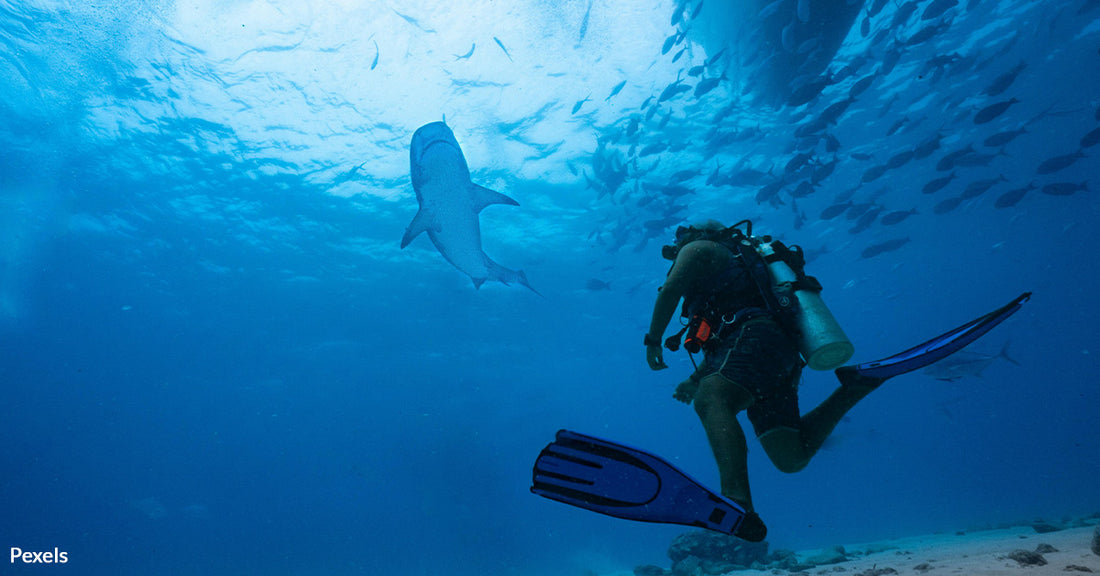Facing Extinction, Sharks Battle Against Overfishing and Human Neglect
Matthew Russell
Pexels
Sharks, the ocean's ancient guardians, are facing a stark reality. Despite centuries of resilience, they now confront an existential threat, primarily due to human activities.
These magnificent creatures are facing critical challenges that current conservation efforts may not be able to overcome.
 Photo: Pexels
Photo: PexelsOver 30% of shark species are threatened with extinction.
Escalating Mortality Rates
A recent study paints a distressing picture: shark mortality rates are on the rise globally. Between 2012 and 2019, shark deaths in fisheries increased from 76 million to 80 million annually, with over 30% involving species threatened with extinction.
This alarming trend continues despite intensified conservation efforts and regulations.
 Photo: Pexels
Photo: PexelsShark mortality rates in fisheries rose from 76 million to 80 million annually between 2012 and 2019.
The Ineffectiveness of Finning Bans
A key focus of shark conservation has been combating finning - the brutal practice of removing shark fins and discarding the rest of the body. While over 70% of countries have implemented finning bans, as reported by the New York Times, these measures have inadvertently contributed to increased demand for shark meat. Consequently, sharks are still being captured and killed in significant numbers, negating the intended impact of these bans.
“We have seen the demand for shark fins decreasing and the demand for shark meat increasing, with Brazil and Italy being the main consumers. Because shark meat is a relatively cheap substitute for other types of fish, there is considerable mislabeling, making some consumers eat shark meat without their knowledge,” study co-author Leonardo Feitosa, a shark biologist at UC Santa Barbara, told Earth.
“Effective conservation actions for sharks are often impeded by lack of community-based awareness and stewardship projects,” said study co-author Nidhi D’Costa, a shark researcher at Dalhousie. “This is especially crucial in countries where small-scale artisanal fisheries are a major driver of shark mortality.”
 Photo: Pexels
Photo: PexelsHabitat destruction and pollution are exacerbating the threats to sharks.
A Global Crisis
The crisis isn't localized but spans the globe, with countries like Indonesia, Brazil, and Malaysia among the major hotspots for shark mortality, The Washington Post reports. The international market for shark products, including meat and fins, fuels this ongoing decline.
Surprisingly, sharks are often found in everyday products and foods, including beauty items and fish-and-chips, unbeknownst to consumers, National Geographic reports.
 Photo: Pexels
Photo: PexelsThe mislabeling of shark meat in the market leads to unknowing consumption.
Comprehensive Bans and Sanctuaries
Despite the grim situation, there is hope. Studies have shown that comprehensive bans on shark fishing and the establishment of shark sanctuaries can significantly reduce mortality rates. Countries like the Maldives and the Bahamas, where shark tourism thrives, exemplify successful conservation strategies, reports The Washington Post. These sanctuaries not only protect sharks but also bolster local economies through eco-tourism.
 Photo: Pexels
Photo: PexelsOver 70% of countries have implemented finning bans, yet shark mortality remains high.
The Need for Effective Regulation and Awareness
The current scenario underscores the urgent need for more effective and targeted conservation measures. This includes improved regulation, enforcement, and public awareness. Encouraging sustainable fishing practices and consumer education about shark-derived products are critical steps in this direction.
As marine biologist Colin Simpfendorfer told National Geographic, “We know that shark populations are under enormous pressure from fishing throughout much of the world’s oceans."
The plight of sharks is a clarion call for urgent action. These apex predators, often termed the "canaries in the coal mine" of ocean health, are vital to the balance and health of marine ecosystems. Their decline signals deeper environmental issues that demand immediate attention.
It's time for a unified, global effort to turn the tide and ensure that these magnificent creatures continue to thrive in our oceans. Click below and help us protect sharks from extinction!
Matthew Russell is a West Michigan native and with a background in journalism, data analysis, cartography and design thinking. He likes to learn new things and solve old problems whenever possible, and enjoys bicycling, spending time with his daughters, and coffee.




















